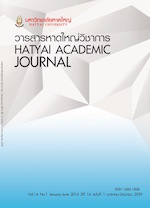การบริหารสถานศึกษาในสังคมพหุวัฒนธรรมในสามจังหวัดชายแดนภาคใต้
Main Article Content
Abstract
บทความนี้มีจุดมุ่งหมายเพื่อหาแนวทางในการบริหารสถานศึกษาของผู้บริหารสถานศึกษา ในการจัดการศึกษาในพื้นที่สามจังหวัดชายแดนภาคใต้ ที่มีความแตกต่างกันระหว่าง ภาษา ศาสนา และวัฒนธรรม ซึ่งมีความแตกต่างกันอย่างสิ้นเชิง จึงเป็นการยากที่ผู้ที่มีส่วนเกี่ยวข้องในการจัดการศึกษาจะเข้าใจ เข้าถึง และพัฒนาให้ชุมชน
สามารถอยู่ร่วมกันในสังคมได้อย่างมีความสุขและนำไปสู่การพัฒนาอย่างยั่งยืน โดยเฉพาะในโรงเรียนซึ่งเป็นหลักให้ความรแู้ก่ผู้เรียนในการยอมรับความแตกต่าง และการเปลี่ยนแปลง จึงถือเป็นบทบาทของผู้บริหารในการบริหารสถานศึกษาที่ต้องใช้หลักการบริหารที่มีประสิทธิภาพมาใช้ในการบริหารสถานศึกษา ประกอบด้วย องค์ประกอบในการบริหารสถานศึกษา คือ ภาวะผู้นำเชิงพหุวัฒนธรรม การพัฒนาครูและบุคลากรทางการศึกษา หลักสูตรและการเรียนการสอน และการมีส่วนร่วม เพื่อให้ได้มาซึ่งการยอมรับในความหลากหลายของอัตลักษณ์ภาษา ศาสนา วัฒนธรรม และเป็นการพัฒนาคุณภาพการศึกษาในสามจังหวัดชายแดนภาคใต้อีกด้วย
School Administration for a Multicultural Society in Three Southern Border
Provinces
The objective of this article is to investigate a guideline for school administration of administrators in educational management for three Southern border provinces where the languages, religion, and culture
are diverse. Many related researches reveal that it is difficult for the educational administrators to understand, access, and develop a community for living together peacefully and leading to sustainable development. Similarly, this problem happens in the school where is a knowledge resource for the students to acknowledge the diversity and change. This difficulty is counted as a role of the administrators to implement an effective administrative principle to school administration. The components in school administration are composed of as follows; multicultural leadership, development of teacher and educational
personnel, curriculum and instruction, and involvement. These can bring an acceptance on diversity in linguistic, religious, and cultural identity including the development of educational quality in three Southern
border provinces.
Article Details
All published articles are evaluated by three qualified peer reviewers from various institutions through a double-blind process, where reviewers do not know the authors’ identities and authors do not know the reviewers’ identities. The content and articles in the Hatyai Academic Journal reflect the authors’ views only and are neither the opinions of the editorial board nor the responsibility of Hatyai University. The Editorial Board of the Hatyai Academic Journal allows articles to be reproduced for academic purposes, on the condition that the original source is clearly cited.


